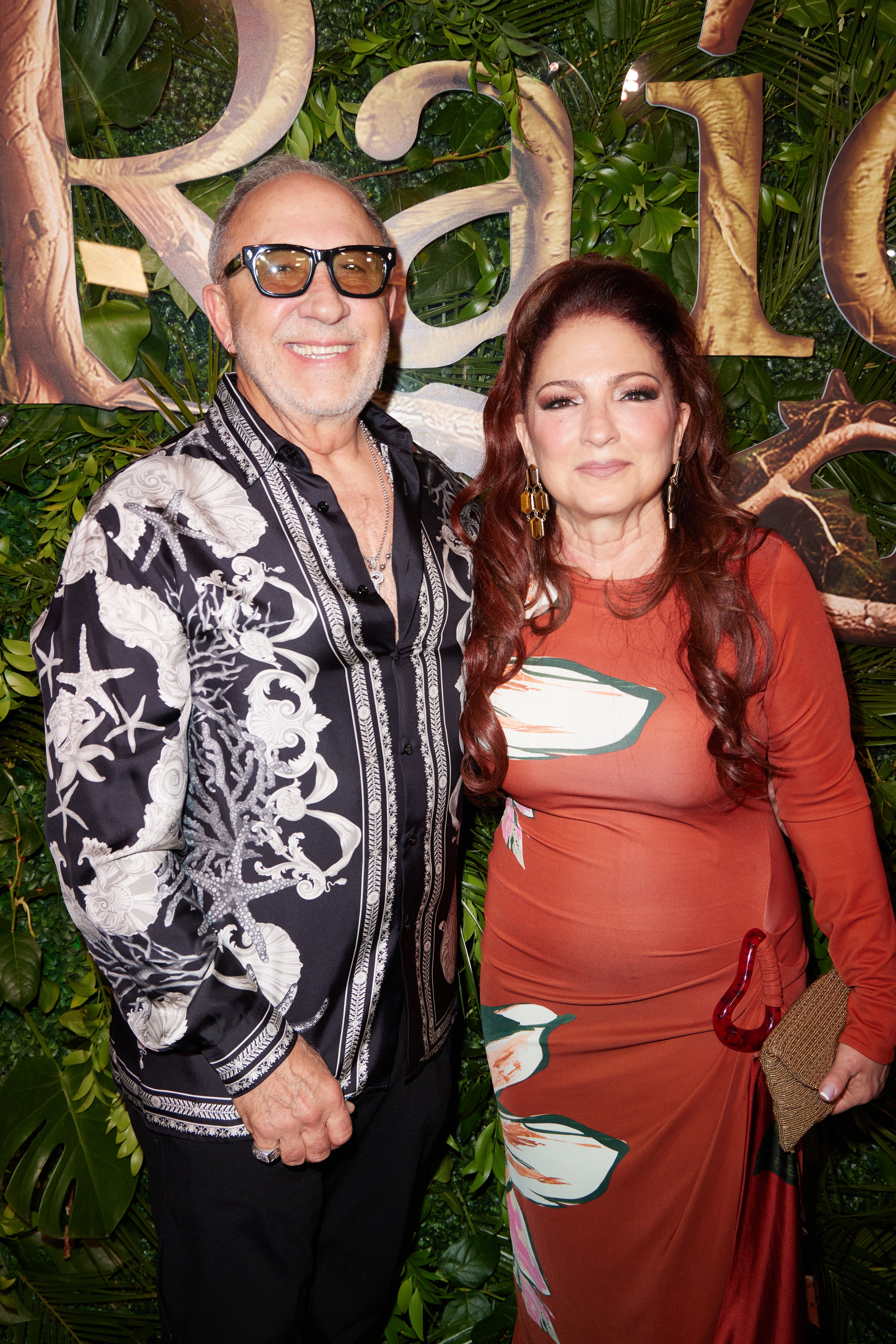
Gloria Estefan still has the Pan Am tickets her father, José, sent her and her mother to get them out of Cuba. Gloria was two years old at the time and José – previously a security guard for the ousted president Fulgencio Batista – had been jailed when Fidel Castro took power in the 1959 revolution. Following his release, he fled to Key West in Florida, sending for his family once he’d found a job. “But then he told my mum, ‘I have to go do something and I can’t tell you what it is,’” Estefan recalls. “And then he disappeared.”
José had been recruited to fight in the Bay of Pigs, the famously doomed 1961 operation, backed by the CIA, to topple Castro. “My dad was the head of the tanks division. But the equipment [was poor] and the turret in his tank was broken. And they were abandoned by the US forces that were supposed to bring ammunition when they landed on the beach.” The invading forces, mostly made up of Cuban exiles, were overpowered and José was arrested. He spent the next two years in Cuba as a political prisoner. “My mum didn’t know what had happened until she saw it on the news,” Estefan says. “She suffered a lot in those years. [Life] was tough and music was my escape from that.”
The reigning queen of Latin pop, Estefan, 67, is talking over Zoom from her home in Miami. Looking immaculate in a fuchsia sweater, her long auburn hair arranged in elegant waves, she is warm, chatty and full of tales from her childhood during which she learnt about resilience and the value of freedom. Propped up on a table next to her is the artwork for her new album Raíces, her first Spanish language album since 2007’s 90 Millas, which includes a lullaby for her grandson, Sasha. The cover finds the present-day Gloria sitting next to an old family photograph which shows her, aged three, in a party dress sitting on her mother’s knee. “That was taken in 1961, so obviously my father was not there,” she notes.
For Estefan, singing in Spanish felt important given “what America is going through and what the immigrants are experiencing right now. We have to be proud of our language, proud of our culture, and put it out there musically. Every day I see the news and I go, ‘Okay, what fresh hell is this?’ Just the inhumanity. Sometimes I don’t watch the news, because if I’m doing something that is creative, I don’t want it permeating that. But I also need to stay informed. We all need to be vigilant. I’ve been here 65 years and I’ve never seen the country this way.” Noting the fate of Cuba, which is still under an authoritarian regime decades later, she adds: “The things that I’m seeing scare me. When you see the judicial branch being ignored, this is dangerous. People in this country think that it’s too big for [it] to fail. No, it can happen. And we need immigration reform, every country does. But the border is pretty much shut down. So what is the necessity of grabbing women and children? They have taken children away from their parents, and now they’re in facilities. What is the need for that?”
Raíces, a salsa-infused celebration of her Cuban heritage, was written by Emilio Estefan, Gloria’s husband of 46 years and her long-term musical collaborator. The couple met in 1975 at an informal jam session, after which she joined his band, the Miami Latin Boys; they later changed their name to Miami Sound Machine to accommodate the woman in their midst. “Emilio has written many songs for me throughout the years, but I think this is his masterpiece,” Estefan states. “By the time I went into the studio, he had these demos that were already like finished products… Raíces means “roots” and it’s about how, because of these roots, this music is still alive in me 50 years into my career.”
Those 50 years have yielded around 30 albums, three Superbowl performances, four Grammys, the Presidential Medal of Freedom (America’s highest civilian honour) and On Your Feet!, a musical about Estefan which premiered in Chicago in 2015 and went to Broadway shortly after (she and her daughter Emily are now working on another musical, Basura, about a real-life Paraguayan orchestra who play instruments made from scrap). In that time, Estefan has racked up 100 million in album sales and a succession of hit singles including “Dr Beat”, “Rhythm Is Gonna Get You”, “Bad Boy”, “Get on Your Feet” and, her signature song, “Conga”.
This year marks 40 years since “Conga”, a fusion of pop and Latin beats, which was inducted into the Grammy Hall of Fame in May. The song propelled Miami Sound Machine to international stardom in 1985, despite it being turned down seven times by their record company, Sony. “Yeah, they weren’t feeling it,” Estefan laughs. “They thought it was too Latin for the Americans and too American for the Latin [market]. I told them: ‘But that’s who we are!’ We used to play it in our gigs before we even recorded it, and people would react as if it was a hit already.” She and Emilio persuaded Puerto Rican DJ and producer Pablo Flores to do a remix, which was picked up by European club DJs. “And then it made its way back [to America] a year later and was a hit,” Estefan says. “It crossed four Billboard charts – pop, dance, Latin and R&B – which hadn’t happened before.”

To Estefan’s delight, “Conga” recently made an appearance in the hit Netflix series Sirens. “Everyone kept sending me messages asking me, ‘Have you seen it?’ We have our own publishing rights so I knew we had given permission for something, but there are so many requests that I don’t remember. But it was a great show, I ripped through the whole thing.”
Estefan learned to sing at the same time she learned to speak, though she was initially shy about performing in front of others. “I was very mouthy at school, but I don’t like being the centre of attention,” she reflects. “It’s not in my nature so I had to get used to that. My mum would make me sing for her friends and play my guitar, and I’d stare at the floor, and then I’d say to her, ‘Why do you make me sing if they’re gonna cry?’ She would say, ‘They’re crying because you moved them, not because they hate it.’”
After her father was released from prison in Cuba, he joined the US army and went to fight in Vietnam. Before he left, he bought two tape recorders, one for his daughters (by now Gloria had a younger sister, Becky) and another which he took away with him. “While he was away, we would send each other tapes. I would sing for him and he would talk to us because he didn’t want us to forget his voice.” Estefan kept on singing throughout her teens but, even after joining Miami Sound Machine, she never saw it as a profession. After graduating high school, she began a course in psychology and got a job as an interpreter for US customs at Miami airport. It wasn’t until the band took off in Latin America that Estefan began to treat it as a career and devoted herself to it full time.
That career was nearly derailed in 1990 when a truck drove into Estefan’s tour bus in Pennsylvania (by this time she was performing as a solo artist), leaving her with a serious spinal injury. Two things saved her from permanent paralysis: “The first was that nature put me on ice. No one knew how important that was at the time, but they do this for people with spinal injuries now. But nature did it for me, as it was snowing outside and inside the bus. The second was a miracle lady behind us in a car who came on board and said, ‘I’m a nurse.’ I told her, ‘I think I broke my back,’ so she sat behind me, put my head in her lap, and said: ‘You cannot move.’”
As firefighters and medics worked to get Estefan out, press photographers arrived and began taking pictures. “I said to Emilio, ‘Babe, I don’t want people to see me like this. Cover me with a blanket.’ And he told me, ‘But then they’re going to think you’re dead!’ I mean, he had a point. So the photographers got their picture [of Estefan being carried on a spinal board] and it was everywhere.”
Estefan endured another trauma in her early life that she has only recently started talking about. When she was nine years old, her mother sent her to a local music school that was run by a friend of the family. The man, who she has never named, sexually abused her. “He told me he’d kill my mother if I told anyone,” she recalls. But as the stress caused Estefan’s hair to start falling out, she told her mother who reported what had happened to the police. “They told her not to put me on the [witness] stand because I would suffer more damage testifying, and it wouldn’t change what happened.”

Estefan made a point of waiting until after her mother died to talk about it openly “because I didn’t want to put her through that. But I knew what would come from it, and I was ready for it. If you knew the number of letters I received from fans telling me about their experiences. I wanted them to see that despite what happens to you, you can’t let someone else write your narrative. I was able to live a beautiful, fulfilling life and that sick individual was not going to ruin anything for me.” Estefan adds that the abuse was never a secret within her own family, and that she coached her children from a young age on what to do should they witness or experience adults behaving inappropriately.
For Estefan, everything comes back to family. Even when thinking about her professional legacy, she says: “I want my kids to be proud of what we’ve done. I want my grandson to hold his head high. Every decision Emilio and I ever made, both musical and personal, we think about what we’re leaving behind to them as an example.”
And the secret of hers and Emilio’s enduring partnership? “Total trust,” she replies, “and being each other’s cheerleaders.” She notes that the pair share a fierce determination in the face of obstacles: “The word ‘no’ is very inspirational to us.” In terms of their work output, age has not slowed them down: “I think we’re speeding up. I don’t know what the hell happened. It’s like pedal to the metal with us. I find this decade for me, in my sixties, has been incredibly creative, maybe because the kids are grown and they have their lives and our time is more our own.”
Yet no matter how busy she and her husband are, Estefan adds, they always make time for family get-togethers. “At weekends, we try to have lunch or dinner with our niece, or with our kids. And I try to spend as much time as possible with Sasha, my grandson. He loves to hang with me. His parents are going to drop him off later today, and we’ll watch season five of Stranger Things because the new season is coming and we want to catch up. So for us, it’s normal life, you know, mixed in with doing what we love, which is music.”
‘Raíces’ is out now







